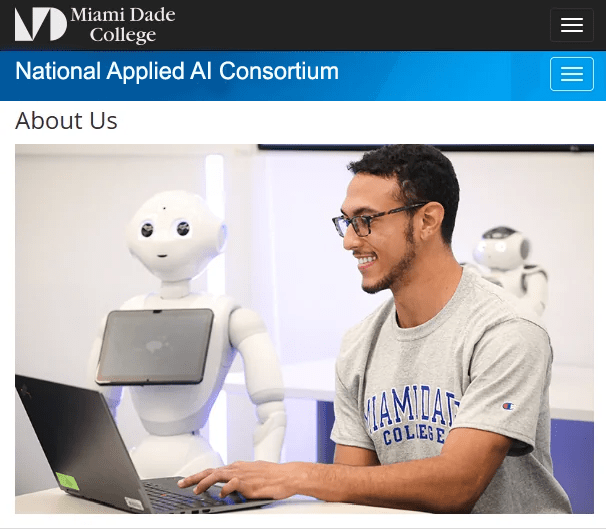
BILT Added to Strategic Plan
South Central College in Minnesota participated in BILT Academy Cohort 1. They found the BILT model compelling because it puts industry partners in a co-leadership role, ensures employer voices are heard and focuses on skills that will be needed in the future. They have adopted the model for multiple programs, and their strategic plan now includes a goal to ensure students have the skills needed to succeed in the workforce through implementation of the BILT model. The college also incorporated the BILT model into its academic workplans.
BILT Drives Innovation
Miami Dade College (MDC) is a pioneer in developing programs focused on careers in Artificial Intelligence (AI). The AI BILT provides MDC faculty and staff with the latest AI trends and industry needs to inform up-to-date curriculum and meaningful experiential learning opportunities for students. The AI BILT consists of executives and technicians, from both large corporations and small companies, who understand the current and future state of AI nationally and what skills make graduates employable. Keeping curriculum current with business demands is the best way to ensure students are hired in this emerging field.
BILT Drives Economic Growth Through Public-Private Partnerships
At Bismarck State College (BSC) in North Dakota, the BILT model drives economic growth. BSC’s first BILT was established in response to an industry request for heavy equipment operators. BSC used the BILT process to create the program. This created trust and strong partnerships between BSC and employers, resulting in donated land and equipment to support the program. BSC has now adopted BILT across the college, establishing an institution-level BILT of key stakeholders from across the state, and divisional level BILTs for five key industry sectors. Program level advisory committees also follow the BILT framework.
Welcome to Pathways to Innovation
Project Overview
The Building Pathways To Innovation (PTI) Through Strategic Employer Engagement (DUE 2039395) project builds on the ATE-supported Business & Industry Leadership Team (BILT) model, a proven method for strategic employer engagement developed by the National Convergence Technology Center. Colleges involved in PTI develop employer partnerships that yield workforce intelligence that facilitates continuous program improvement and innovation.
What’s So Unique About the BILT?
The frequency, specificity, and depth of business input, coupled with an industry-led governance structure, sets the BILT model apart. BILTs embrace the notion that employer engagement is not an event, but a process built on trusted relationships between colleges and companies. BILTs leverage the sector knowledge of employers and teaching expertise of faculty to foster powerful collaborations that ensure program curriculum meets the needs of business and students are workforce ready. Through cohort-based technical assistance, PTI helps colleges implement and sustain the BILT model. BILT Academy, PTI’s flagship initiative, provides participants with tools and strategies to embed innovation and employer co-leadership into their programs.

BILT Academy
The BILT Academy offers 1-on-1 coaching for teams from community college STEM programs to strategically engage employer partners.

Cohort 6 Announced: Advancing Employer Engagement
The next chapter of the BILT Academy is underway!

Journal of ATE Article Highlights BILT Model's Role in Aligning Bioprocessing Education with Workforce Needs

Looking to implement BILT for AI curriculum?
Pathways to Innovation is a project of the Center for Occupational Research and Development supported by the National Science Foundation Advanced Technological Education Program [DUE 2039395]. Any opinions, findings, and conclusions or recommendations expressed in this material are those of the author(s) and do not necessarily reflect the views of NSF.
© CORD

